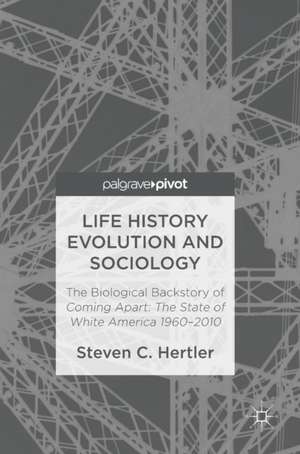Life History Evolution and Sociology: The Biological Backstory of Coming Apart: The State of White America 1960-2010
Autor Steven C. Hertleren Limba Engleză Hardback – 7 feb 2017
| Toate formatele și edițiile | Preț | Express |
|---|---|---|
| Paperback (1) | 408.27 lei 43-57 zile | |
| Springer International Publishing – 13 iul 2018 | 408.27 lei 43-57 zile | |
| Hardback (1) | 414.42 lei 43-57 zile | |
| Springer International Publishing – 7 feb 2017 | 414.42 lei 43-57 zile |
Preț: 414.42 lei
Nou
Puncte Express: 622
Preț estimativ în valută:
79.31€ • 82.30$ • 66.29£
79.31€ • 82.30$ • 66.29£
Carte tipărită la comandă
Livrare economică 17-31 martie
Preluare comenzi: 021 569.72.76
Specificații
ISBN-13: 9783319487830
ISBN-10: 3319487833
Pagini: 82
Ilustrații: X, 73 p.
Dimensiuni: 148 x 210 x 6 mm
Greutate: 0.25 kg
Ediția:1st ed. 2016
Editura: Springer International Publishing
Colecția Palgrave Macmillan
Locul publicării:Cham, Switzerland
ISBN-10: 3319487833
Pagini: 82
Ilustrații: X, 73 p.
Dimensiuni: 148 x 210 x 6 mm
Greutate: 0.25 kg
Ediția:1st ed. 2016
Editura: Springer International Publishing
Colecția Palgrave Macmillan
Locul publicării:Cham, Switzerland
Cuprins
1. A Fault Line Fifty Years in the Making.- 2. The Biology of Bifurcation.- 3. Life History Evolution: An Explanatory Framework.- 4. Aggregating the Biological, Psychological and Sociological.- 5. Questions of Etiology, Change, Policy, Mating and Migration variation?.- 6. The Biology of Sociology: Pitting Ideology against Elegance.
Notă biografică
Steven C. Hertler is Adjunct-Assistant Professor of Psychology for the College of New Rochelle, USA. Focusing on personality, evolutionary ecology, comparative psychology, and theoretical sociobiology, he has served as the sole or principal author for 14 peer-reviewed journal articles, as well as contributing to several Sage reference guides, and serving as a senior editor for Europe’s Journal of Psychology.
Textul de pe ultima copertă
This book supplies the evolutionary and genetic framework that Charles Murray, towards the end of Coming Apart: The State of White America 1960-2010, predicts will one day explain revolutionary change in American society. Murray’s Coming Apart documents 50 years of changed college admissions, government incentives, mating and migration patterns that have wrought national divisions across indexes of marriage, industriousness, honesty, and religiosity. The framework discussed is life history evolution, a sub-discipline within evolutionary biology singly capable of explaining why violent crime, property crime, low marriage rates, father absence, early birth, low educational achievement, low income, poverty, lack of religiosity and reduced achievement striving will reliably co-occur as part of a complex. This complex augments facultatively, developmentally and evolutionarily in response to unpredictable and uncontrollable sources of mortality. The uncertain tenure of life wrought by unpredictable and uncontrollable mortality selects for a present-oriented use of bioenergetics resources recognizable as the social ills of Fishtown, Murray’s archetypal working class community. In turn, the thirty years of life history literature herein reviewed confirms the biological logic of elite intermarriage and sequestration. The source of life history variation, policy implications, and demography are discussed.
Steven C. Hertler is Adjunct-Assistant Professor of Psychology for the College of New Rochelle, USA. Focusing on personality, evolutionary ecology, comparative psychology, and theoretical sociobiology, he has served as the sole or principal author for 14 peer-reviewed journal articles, as well as contributing to several Sage reference guides, and serving as a senior editor for Europe’s Journal of Psychology.
Caracteristici
Presents the unique approach of applying life history evolution to the Charles Murray's Coming Apart Helps readers better understand the unity and biology behind declining marriage rates, migration, poverty, and crime Of interest to researchers in sociology, psychology, sociobiology, and human development
